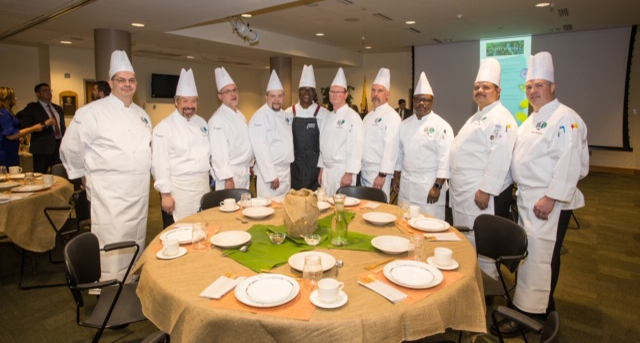Sacking the competition: Hackensack-Meridian breaks sustainable food records
 Jersey Shore University Medical Center's culinary team put together a menu that wasted exactly nothing. From baked avocado to
Jersey Shore University Medical Center's culinary team put together a menu that wasted exactly nothing. From baked avocado to
cauliflower “dumplings,” the meal was an example of climate-friendly food in every way. (Hackensack Meridian Health)
When it comes to promoting healthier foods, Hackensack Meridian Health, the largest and most comprehensive health care network in New Jersey, knows what strategies work most effectively for their patients, visitors, and team members. The network continues to increase healthy food options and decrease their climate footprint.
They have learned that using words like “meat-reduction,” “vegan,” or “vegetarian” to try to promote something on their menu is a “turn-off” to customers. When they promoted, “Meatless Mondays,” they would inevitably experience less sales. Instead, descriptive words and sensory details are used to describe dishes. Just dropping buzzwords like “Meatless Monday” had a positive impact on sales.
In presentations to leadership, food service team members discuss how this aligns with initiatives such as hypertension and the reduction of other chronic diseases. In addition to the health benefits, the reduction in meat also reduces the costs for food services as meat is the most expensive item purchased.
Due to the size of the health care network and the different food service management companies at individual facilities (two are self-operated hospitals, five hospitals are with Morrison, and six with Sodexo), what works at one hospital may not work at another, and they may take a different but equally effective approach. By being flexible in their approach it has reduced the amount of push-back when changes have been implemented.
Hackensack Meridian Health, a 2019 Practice Greenhealth System for Change Award winner, started its journey down the sustainable food road by first offering antibiotic-free meat and poultry and reducing sugar-free beverages.
“Our hospitals that started with ‘antibiotic-free’ foods a year and a half ago [three of our six hospitals], are at about 40% now. Most of our hospitals are between 40 and 90%. One hospital has achieved 98%,” Kyle Tafuri, director of sustainability, explains, referring to the percentage of food products without antibiotics purchased.
System-wide, Hackensack Meridian Health rose to the top 10% of Practice Greenhealth members in 2019, 58% of its total meat spending is sustainable, which places the network in the 90th percentile. In addition to the purchase of sustainable meat, Hackensack University Medical Center has reduced its meat purchases by nearly 10,000 pounds in the last five years.

Two plant-forward meals served in Hackensack-Meridian Health facilities. (Hackensack Meridian Health)
Tafuri says the blended burger and the Impossible Burger have changed the conversation about plant-based. “We’ve engaged people we weren’t able to reach previously who were less likely to try any plant-based foods. Whenever [the blended burger] is for sale, it’s the best selling item,” he says. They make their blended burgers in-house. Different sites use different ratios of meat to mushrooms.
The health network is now working on boosting local purchasing which, Tafuri admits, has been the most challenging of the sustainable food initiatives. Even though they are based in the “Garden State,” they have found that price is a significant hurdle when trying to buy local. A handful of hospitals are working on creating a 100% local salad bar. They also plan to feature locally raised items during special events.
Jersey Shore University Medical Center recently hosted a “zero food waste dinner” that was all plant-based. The chefs enjoy these opportunities because they have the autonomy to be creative and working on plant-forward dishes has expanded their opportunities to be innovative.
The health network’s “less meat, better meat” initiatives have resulted in nearly a 5% reduction in greenhouse gas emissions from meat purchases at Hackensack University Medical Center.
Hackensack Meridian Health is the largest health care system to join the Cool Food Pledge, a new platform to help hospitals offer diners more of what they want while slashing food-related greenhouse gas emissions, saving costs, and improving health. The pledge is a cross-sector initiative championed by the World Resources Institute. Health care is leading the pack with 30 facilities signed on so far to reduce their emissions from food purchasing, along with five signatories from other sectors including Hilton, Monde Nissin, and Morgan Stanley.
Tafuri asserts that they are already doing a lot of work to reduce their carbon footprint when it comes to food purchasing, so the Cool Food Pledge seemed like a great way to both promote what they are already doing and provide additional support to further their work.

 The proud culinary team behind the "zero waste dinner" at Jersey Shore University Medical Center. (Hackensack Meridian Health)
The proud culinary team behind the "zero waste dinner" at Jersey Shore University Medical Center. (Hackensack Meridian Health)